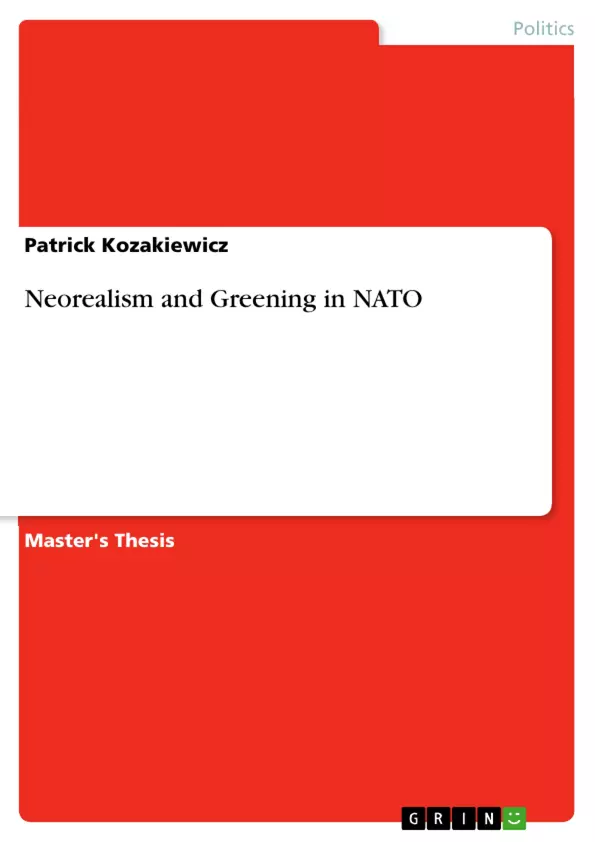
Neorealism and Greening in NATO
Masterarbeit, 2014
75 Seiten, Note: very good
Leseprobe
Inhaltsverzeichnis (Table of Contents)
- Chapter 1: Introduction
- Theoretical background
- Research questions
- Justification
- The choice of case
- Hypotheses
- Definitions
- Research strategy
- The choice of theory
- Chapter 2: Theoretical Framework
- The Roots of Neorealism
- Kenneth Waltz: The Father of Neo-Realism
- Balance of Power
- Neorealism, Cooperation and Alliances
- Methodological Approach
- Data sources
- Operationalization
- Expected Empirical Findings
- General neorealist predictions
- Specific neorealist predictions with regards to greening
- Chapter 3: NATO with respect to Energy
- Chapter 4: Greening
- The United States
- The United Kingdoms
- The European Union
- Turkey
- Chapter 5: Interpretation of Greening using Neorealism
- Chapter 6: Answers to Research Questions and Hypothesis
Zielsetzung und Themenschwerpunkte (Objectives and Key Themes)
This thesis examines the process of “greening” within NATO, specifically with regards to energy security, using the theoretical framework of Neorealism. The study aims to explore how this theory can help understand the military self-sufficiency of NATO member states and the implications of their greening efforts.
- The role of Neorealism in understanding military self-sufficiency and greening within NATO
- The relationship between energy security and greening policies within NATO member states
- The impact of anarchical structures on NATO's greening efforts
- The potential for cooperation and conflict within NATO related to greening policies
- The benefits of using Neorealism to analyze greening initiatives within NATO
Zusammenfassung der Kapitel (Chapter Summaries)
Chapter 1: The introduction discusses the importance of energy security in military strategy and outlines the gap in literature regarding NATO's greening efforts. It establishes the research questions, hypotheses, and methodology of the study, emphasizing the relevance of the neorealist perspective.
Chapter 2: This chapter explores the theoretical framework of Neorealism, tracing its roots back to Kenneth Waltz and highlighting key concepts like balance of power, self-sufficiency, and the role of anarchical structures in international relations. It also presents the specific predictions of Neorealism regarding greening initiatives.
Chapter 3: This chapter examines NATO's relationship with energy security, providing context for the analysis of greening efforts.
Chapter 4: The chapter delves into the greening policies of specific NATO member states, including the United States, the United Kingdom, the European Union, and Turkey.
Chapter 5: This chapter analyzes the greening policies of NATO member states through the lens of Neorealism, demonstrating the theory's applicability to this case study.
Chapter 6: This chapter presents answers to the research questions and discusses the validity of the hypotheses, drawing conclusions based on the analysis presented in previous chapters.
Schlüsselwörter (Keywords)
This study focuses on key concepts and themes like Neorealism, greening, energy security, military self-sufficiency, NATO, international relations, anarchical structures, balance of power, and the relationship between environmental and security issues. It also examines the individual greening policies of specific NATO member states, such as the United States, the United Kingdom, the European Union, and Turkey.
Frequently Asked Questions
What is "greening" in the context of NATO?
Greening refers to the process of transitioning military energy use toward more sustainable and secure sources to ensure energy security and operational efficiency.
How does Neorealism explain NATO's energy policies?
Neorealism, based on Kenneth Waltz's theories, emphasizes military self-sufficiency and the survival of states in an anarchical system, driving members to secure independent energy sources.
Why is military self-sufficiency important for NATO members?
In an anarchical international structure, states must minimize their dependence on external energy suppliers to maintain their strategic autonomy and defense capabilities.
Which countries' greening policies are analyzed in this thesis?
The study focuses on the greening initiatives of the United States, the United Kingdom, Turkey, and the European Union as a whole.
What is the "anarchical structure" in Neorealism?
It refers to the absence of a central world government, forcing states to rely on self-help and balance of power to ensure their security.
How does energy security relate to environmental issues in the military?
While greening has environmental benefits, for NATO, the primary driver is often the strategic need for reliable, diverse, and secure energy supplies to power military operations.
Details
- Titel
- Neorealism and Greening in NATO
- Hochschule
- Universitas Wratislaviensis (Political Science)
- Note
- very good
- Autor
- Patrick Kozakiewicz (Autor:in)
- Erscheinungsjahr
- 2014
- Seiten
- 75
- Katalognummer
- V282100
- ISBN (eBook)
- 9783656765998
- ISBN (Buch)
- 9783656766001
- Dateigröße
- 678 KB
- Sprache
- Englisch
- Schlagworte
- neorealism greening nato
- Produktsicherheit
- GRIN Publishing GmbH
- Preis (Ebook)
- US$ 31,99
- Preis (Book)
- US$ 45,99
- Arbeit zitieren
- Patrick Kozakiewicz (Autor:in), 2014, Neorealism and Greening in NATO, München, Page::Imprint:: GRINVerlagOHG, https://www.diplomarbeiten24.de/document/282100
- Autor werden
- Ihre Optionen
- Vertriebskanäle
- Premium Services
- Autorenprofil
- Textarten und Formate
- Services für Verlage, Hochschulen, Unternehmen

- © GRIN Publishing GmbH.
- Alle Inhalte urheberrechtlich geschützt. Kopieren und verbreiten untersagt.
- info@grin.com
- AGB
- Open Publishing
Der GRIN Verlag hat sich seit 1998 auf die Veröffentlichung akademischer eBooks und Bücher spezialisiert. Der GRIN Verlag steht damit als erstes Unternehmen für User Generated Quality Content. Die Verlagsseiten GRIN.com, Hausarbeiten.de und Diplomarbeiten24 bieten für Hochschullehrer, Absolventen und Studenten die ideale Plattform, wissenschaftliche Texte wie Hausarbeiten, Referate, Bachelorarbeiten, Masterarbeiten, Diplomarbeiten, Dissertationen und wissenschaftliche Aufsätze einem breiten Publikum zu präsentieren.
Kostenfreie Veröffentlichung: Hausarbeit, Bachelorarbeit, Diplomarbeit, Dissertation, Masterarbeit, Interpretation oder Referat jetzt veröffentlichen!
- GRIN Verlag GmbH
-
- Nymphenburger Str. 86
- 80636
- Munich, Deutschland
- +49 89-550559-0
- +49 89-550559-10
- info@grin.com
-









